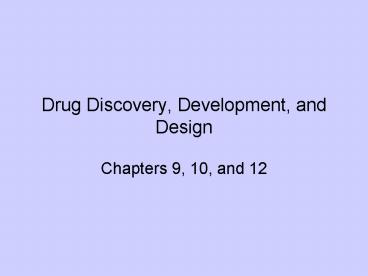Drug Discovery, Development, and Design - PowerPoint PPT Presentation
1 / 48
Title:
Drug Discovery, Development, and Design
Description:
Drug Discovery, Development, and Design. Chapters 9, 10, and 12. History ... 2.23 meperidine (Demerol) 2.24 dextropropoxyphene (Darvon) 2.25 methadone. back ... – PowerPoint PPT presentation
Number of Views:1110
Avg rating:5.0/5.0
Title: Drug Discovery, Development, and Design
1
Drug Discovery, Development, and Design
- Chapters 9, 10, and 12
2
Drug Discovery
- History
- General plan
- Successful process
- More than 10 years
- More than 300 million
- More than 10000 tested compounds
- For one drug!
IV. Optimize lead
III. Find a lead compound
II. Choose a drug target
I. Choose a disease
VI. Market
V. Clinical Trials
3
I. Choosing a Disease
- What factors?
- Medical
- Economic
- Geographical
4
II. Choosing a Drug Target
- What are they?
- How are they discovered?
- From drugs
- From chemical messengers
- Molecular genetics
- Multiple targets
- Bioassay
- In Vitro
- High throughput screening
- NMR
- In Vivo
5
III. Find a Lead Compound
- Where?
- Random screening
- Synthetic chemicals
- Natural products
6
III. Find a Lead Compound
- Existing drugs
- Previously marketed for same disease
- Used for other diseases
7
III. Find a Lead Compound
- Existing drugs
- Natural substrate or product
- Alter structure (cimetidine)
- Product of enzyme catalysis
- Enzyme inhibitor
- Allosteric substrate
8
III. Find a Lead Compound
- Existing drugs
- Natural substrate or product
- Combinatorial synthesis
9
III. Find a Lead Compound
- Existing drugs
- Natural substrate or product
- Combinatorial synthesis
- Computer-aided design
- X-ray crystallography of binding sites
- Molecular modeling to design drug
10
III. Find a Lead Compound
- Existing drugs
- Natural substrate or product
- Combinatorial synthesis
- Computer-aided design
- Chance
11
III. Find a Lead Compound
- Existing drugs
- Natural substrate or product
- Combinatorial synthesis
- Computer-aided design
- Chance
- NMR
Binding Site
Protein
12
Protein
NO OBSERVABLE BIOLOGICAL EFFECT
13
13C NMR
14
CH3
CH
CH
CH3
CH2
CH2
CH
C
C
13C NMR
15
Protein
Optimize epitope
16
Protein
Optimize epitope
Optimize epitope
17
Link
Protein
Optimize epitope
Optimize epitope
18
LEAD COMPOUND
19
Me
Epitope B
Epitope A
20
Lead compound
21
III. Find a Lead Compound
- After lead compound is found, but before
optimizing - Isolate
- Purify
- Structural confirmation
22
IV. Optimize Lead Compound
- Structure-activity relationships (SARs)
Alcohol
Amine
23
Alkene
Aromatic
No fit
24
IV. Optimize Lead Compound
Ketone
Ester
25
Esters as prodrugs
26
Amide
27
Carboxylic acids
28
Isosteres and Bioisosteres
Propranolol
29
Other functional groups
- Acid chlorides
- Anhydrides
- Alkyl halides
- Aryl halides
- Nitro groups
- Alkynes
- Thiols
- Nitriles
30
Example
Slightly reduced activity
Activity eliminated
Activity eliminated
31
IV. Optimize Lead Compound
- Analogs of pharmacophore (remember morphine)
- Goals?
- 1. Variation of alkyl substituents
- 2. Variation of chain length
32
3. Extension of structure
33
Example
Adrenaline
Salbutamol (Ventolin) (Anti-asthmatic)
Propranolol (b-Blocker)
34
b-Adrenoceptor
35
b-Adrenoceptor
SALBUTAMOL
36
a-Adrenoceptor
37
a-Adrenoceptor
38
Variation of Ring Size and Structure
4. Change in substitution pattern
39
Variation of Ring Size and Structure
5. Variation in ring size
6. Variation in ring structure
40
7. Simplification
41
Procaine from Cocaine
42
8. Rigidification
43
Example
Less active
More active
44
Problems to Consider
- Pharmacokinetics
- Metabolism
- Prodrugs
- Synthesis/Manufacturing process
45
V. Toxicity Testing and Clinical Trials
- Testing
- Trials
- Phase 1
- Phase 2
- Phase 3
- Phase 4
- Orphan drugs
46
VI. Market
- Patents
- Pharmaceutical reps
- AMSA PharmFree project
47
Oxamniquine
- Case study
- Read pp.219-223 and summarize (5 point
assignment) - Due Wednesday, 3/12
48
Pharmacophore
2.19 morphine (R R H) codeine (R CH3, R
H) heroin (R R COCH3)
2.20 levorphanol (R OH) 2.23 meperidine
(Demerol) 2.24 dextropropoxyphene
(Darvon) 2.25 methadone
back































